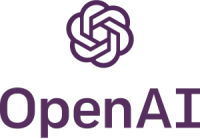OpenAi
|
OpenAi is a nonprofit artificial intelligence research organization that aims to research and develop safe and ethical paths to artificial general intelligence, systems that can complete any intelligent task. The organization researches artificial intelligence in collaboration with Microsoft, Infosys, Amazon, Y research as well as others. It [1]. The founders, Elon Musk and Sam Altman are inspired by the ethical implications, misuse, and risks of intelligent systems.[2]
History
The organization was founded on December 11, 2015, by Elon Musk, Peter Thiel, Reid Hoffman, and Sam Altman. OpenAi's headquarters are located in San Fransico, California.[3] The name OpenAi refers to the organization's stance on open collaboration through their publicly available research and patents. In 2015, the investors pledged one billion dollars, that are to be allocated to the research purposes.[4] On April 27, 2016, the organization released the first public beta of OpenAi Gym. The product's purpose to help train artificial intelligent systems using reinforcement learning.[5] On December 5th 2016, OpenAi released Universe, a platform to train and test machine learning systems across thousands of games and applications with the goal of creating a generally intelligent system.[6] In August 2017, OpenAi used an AI bot to play in the International 2017 Dota 2 video game tournament. The bot won against an internationally recognized Dota 2 player in a live 1v1 match. The bot learned to play the game over the course of two weeks by playing against itself. [7] In February 2018 Elon Musk resigned from the board to a potential conflict of interest with his involvement with the electric vehicle manufacturer Tesla.[8]
Platforms
OpenAi Gym
Gym is a machine learning toolkit use to train AI algorithms using reinforcement learning. The platform is built in Python and supports training algorithms for general uses. It works by giving rewards when the algorithm completes tasks in the direction of winning the game. It can help train algorithms to play games like pong or pinball [9][10]
Open Ai Baselines
Baselines are a set of fundamental, reinforcement learning algorithms that can be used for a wide range of topics. OpenAi released these in May 2017, to help researcher implement machine learning into various subtopics and ideas.[11]
Tools
OpenAi has released a number of tools to help developers and researchers innovation on machine learning techniques with the goal of a generalized intelligence. Some of the tools that they have released include.[12]
- Roboschool
- Universe
- rllab
- evolution-strategies-starter
- kubernetes-ec2-autoscaler
- pixel-cnn
Ethics
The organization was founded with the motive to help build an artificial general intelligence in a safe way. Elon Musk, one of the co-founders believes that AI is humanity's "biggest existential threat." Musk has asked government agencies to consider regulating artificial intelligence and be proactive. He believes that AI could be dangerous to humankind and has stated that the colonization of Mars is partially a backup plan if AI is to turn on humans. OpenAi's mission is to advance artificial intelligence to benefit humanity without the need for financial gains.[13] The OpenAi website states that "It's hard to fathom how much human-level AI could benefit society, and it's equally hard to imagine how much it could damage society if built or used incorrectly."[14] Stephen Hawking has expressed his concerns that artificial intelligence could replace humans entirely resulting in the end of humanity.[15]The organization believes that artificial intelligence will be the most important technology that humans will create.[16]Elon has stated that although there are risks to advancing artificial intelligent technology, doing so in such a way to "to empower as many people as possible to have AI. If everyone has AI powers, then there's not any one person or a small set of individuals who can have AI superpower."[17]
References
- ↑ www.openai.com
- ↑ Markoff, John. “Artificial-Intelligence Research Center Is Founded by Silicon Valley Investors.” The New York Times, The New York Times, 11 Dec. 2015, www.nytimes.com/2015/12/12/science/artificial-intelligence-research-center-is-founded-by-silicon-valley-investors.html.
- ↑ Markoff, John. “Artificial-Intelligence Research Center Is Founded by Silicon Valley Investors.” The New York Times, The New York Times, 11 Dec. 2015, www.nytimes.com/2015/12/12/science/artificial-intelligence-research-center-is-founded-by-silicon-valley-investors.html.
- ↑ http://www.bbc.com/news/technology-35082344
- ↑ Dave Gershgorn (27 April 2016). "Elon Musk's Artificial Intelligence Group Opens A 'Gym' To Train A.I." Popular Science. Retrieved 29 April 2016.
- ↑ Mannes, John. "OpenAI's Universe is the fun parent every artificial intelligence deserves". TechCrunch. Retrieved 31 December 2016.
- ↑ "Dota 2". blog.openai.com. Retrieved 12 August 2017.
- ↑ https://www.theverge.com/2018/2/21/17036214/elon-musk-openai-ai-safety-leaves-board
- ↑ Dave Gershgorn (27 April 2016). "Elon Musk's Artificial Intelligence Group Opens A 'Gym' To Train A.I." Popular Science. Retrieved 29 April 2016.
- ↑ https://gym.openai.com/
- ↑ https://github.com/openai/baselines
- ↑ https://openai.com/systems/
- ↑ "Tech giants pledge $1bn for 'altruistic AI' venture, OpenAI". BBC News. 12 December 2015. Retrieved 19 December 2015.
- ↑ https://www.openai.com/about/
- ↑ https://www.independent.co.uk/life-style/gadgets-and-tech/news/stephen-hawking-artificial-intelligence-fears-ai-will-replace-humans-virus-life-a8034341.html
- ↑ https://www.openai.com/about/
- ↑ "Silicon Valley investors to bankroll artificial-intelligence center". The Seattle Times. 13 December 2015. Retrieved 19 December 2015.
